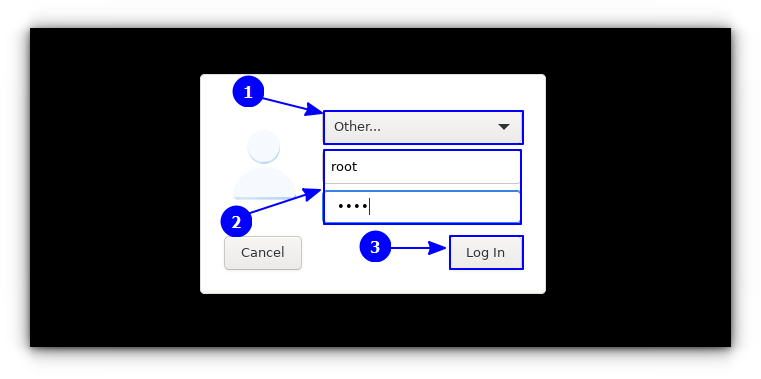Yes, RunCloud is beginner-friendly without sacrificing power. The dashboard is intuitive, the setup processes are automated, and tasks like SSL setup, backups, and app deployment are simplified, making it accessible for newcomers and time-saving for experienced users.When you pick RunCloud, you won’t encounter hidden fees, bloated interfaces, or fragmented plugin ecosystems. Instead, you’ll find a sleek, unified platform designed to streamline your workflows, accelerate your deployments, and help you deliver better results faster.However, this WordPress-specific optimization also comes with certain limitations. SpinupWP doesn’t cater to broader use cases, such as managing PHP applications beyond WordPress, customizing server stacks, or deploying Node.js apps. If your projects grow beyond WordPress or require flexibility across different frameworks and languages, you may quickly find SpinupWP’s focus too narrow.Unlike cPanel, which was built in a different era and retrofitted over time, RunCloud is engineered for developers, startups, and agencies who care about performance, flexibility, and ease of use. It integrates seamlessly with multiple cloud providers such as DigitalOcean, Vultr, Linode, AWS, and Hetzner, and supports both x86 and ARM architectures.By contrast, RunCloud offers the same Git-based deployment and framework support, but layers in far more control, flexibility, and visibility over your entire stack. From real-time server metrics to advanced caching, multi-user access, and staging environments, RunCloud is built to scale alongside your technical demands, not just simplify your first deployment.
Table of Contents
- 1 How to Pick a Server Management Solution
- 2 Top cPanel Alternatives to Manage Servers
- 3 Final Thoughts: Why You Should Use RunCloud
- 4 Frequently Asked Questions About cPanel Alternatives
- 4.1 What are the best free and open-source alternatives to cPanel?
- 4.2 Can I host a website without using cPanel?
- 4.3 What are the benefits of using RunCloud over traditional control panels?
- 4.4 Is RunCloud a good alternative to cPanel for beginners?
- 4.5 How easy is it to migrate from cPanel to an alternative like RunCloud?
- 4.6 Can I migrate my WordPress site from cPanel to RunCloud?
- 4.7 Does RunCloud support both Nginx and Apache server stacks?
- 4.8 Why is cPanel often slower compared to modern alternatives?
- 4.9 Can cPanel be hacked if not properly configured?
- 4.10 Does RunCloud include automated backup options?
- 4.11 Is RunCloud more affordable than cPanel?
- 4.12 Which is the best cPanel alternative for WordPress hosting?
- 4.13 Does RunCloud support hosting non-WordPress applications?
- 4.14 Does RunCloud offer customer support if I run into issues?
- 4.15 Can RunCloud scale with my business as I grow?
How to Pick a Server Management Solution
For teams that want freedom and peace of mind, RunCloud provides a far more reliable and scalable foundation with an active development roadmap, predictable updates, and responsive support.ServerPilot is built to manage cloud servers, particularly for PHP applications like WordPress. It focuses on offering a lightweight panel that enables users to set up and manage cloud instances without needing extensive server administration knowledge. ServerPilot supports modern protocols such as HTTP/3 and handles multiple PHP versions concurrently using PHP-FPM, which helps optimize server performance by scaling PHP processes automatically based on demand.
- Security: If you run a business online, keeping your website and customer data secure is mandatory. You should only pick a provider that protects your server without any additional effort. RunCloud simplifies this by including essential security configurations out of the box, saving you time and significantly lowering your risk exposure.
- Cost Efficiency: Sometimes, the licensing cost for a server management system can exceed the cost of the hosting itself. If you have limited funds, you should look for more affordable options without sacrificing essential functionality. RunCloud’s transparent, flat-rate pricing ensures you can grow your infrastructure without hidden fees or unexpected charges – something few traditional control panels can match.
- Deployment Models: Understanding the difference between self-hosted solutions (which provide greater control but require technical expertise) and SaaS offerings (which prioritize convenience but may limit customization) is crucial for selecting the right alternative. RunCloud perfectly bridges this gap: It offers the simplicity of SaaS onboarding without stripping away server-level control.
- User Experience: The ideal server management solution should balance power with accessibility. It should offer intuitive interfaces that don’t require extensive technical knowledge to navigate effectively. RunCloud’s dashboard is designed by developers, for developers, with a clean, modern interface that doesn’t hide essential functionality behind layers of menus.
- Scalability: As your projects grow, your chosen control panel should scale accordingly, providing additional features and capacity without significant cost increases or performance degradation. RunCloud is trusted by everyone from solo developers to large agencies managing hundreds of applications across multiple servers, offering a smooth path from the first project to full portfolio management.
Froxlor remains a workable option for hobbyists or technically proficient sysadmins. However, RunCloud provides a far more powerful, scalable, and reliable solution for anyone building mission-critical projects or growing a hosting business.
Top cPanel Alternatives to Manage Servers
| cPanel Alternative | Ease of use | Nginx, OpenLiteSpeed, Docker Support | Pricing | Best For |
| RunCloud | Very easy to use | Yes | From $9/month | Developers, agencies, managed WordPress hosting |
| ApisCP | Relatively straightforward | No | From $2.50/month | Hosting resellers and power users |
| Moss.sh | Easy to use | No | Free or from $9/month | Lightweight dev teams with Git-based workflows |
| SpinupWP | Easy to use | No | From $12/month | WordPress-only users |
| ServerPilot | Straightforward | No | From $5/server + $0.50/app/month | Basic PHP hosting |
| Virtualmin | Easy to use | No | Free or $7.50/month (Pro) | Linux-savvy admins |
| Ajenti | Needs technical knowledge | No | Free | Experimental users |
| Froxlor | Easy to use | No | Free | Minimalist control panel fans |
| Plesk | Easy | No | From $14.20/month | Shared Windows/Linux hosting |
📖 Recommended Read: WordPress Migration to Cloud ServersAjenti Panel, the default distribution, bundles a startup script and a collection of standard administrative plugins, such as a file manager, network configuration tools, and service management utilities. This creates a lightweight, ready-to-use control panel experience for users who want to manage basic server functions without relying on heavyweight alternatives like cPanel.
1. RunCloud
RunCloud was built for modern developers. It offers fast deployments, Git integration, performance monitoring, caching solutions, automated backups, and multi-server management – all without the clutter and limitations typical of traditional panels like cPanel and Plesk.📖 Recommended Read: Host Multiple Websites on One Server
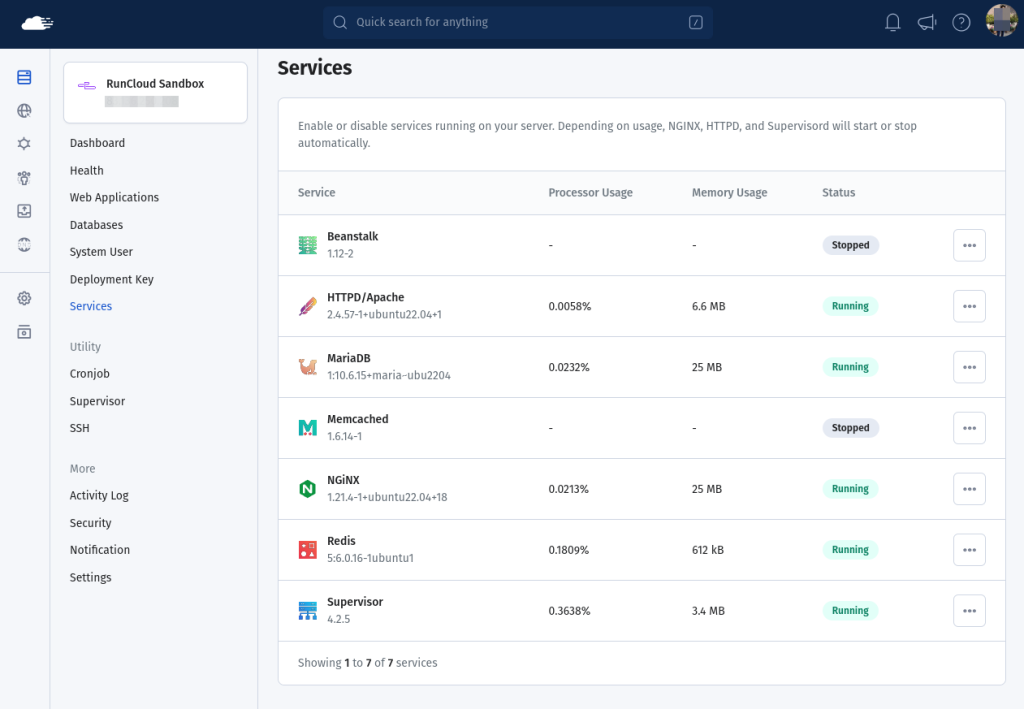
Core Features and Advantages
- One-Click Application Installation: It allows you to deploy essential applications like phpMyAdmin and WordPress instantly with a single click.
- Built-in Security Framework: It has sensible security defaults implemented out of the box, including firewall configurations, secure SSH settings, and automatic security updates that protect your server from day one.
- Comprehensive Resource Monitoring: You can use it to monitor server performance metrics directly from the RunCloud dashboard. This allows you to track CPU usage, memory consumption, and disk space without installing additional tools.
- Advanced Performance Insights: You can use it to identify performance bottlenecks through slow script monitoring and top path tracking. These tools give you actionable data to optimize your applications and speed up your site.
- Automated Backup System: RunCloud protects your valuable data with scheduled automated backups that can be configured to store critical files and databases locally or in remote storage solutions of your choice.
- Flexible Server Stack Options: When you use RunCloud, you can choose between multiple Nginx and Apache server configurations (on x86 and ARM servers) to find the perfect balance of performance and compatibility for your specific applications.
- Advanced Caching Solutions: Boost website performance with support for multiple caching technologies, including Nginx full-page caching, Redis object caching, and LS Cache for lightning-fast content delivery.
- Streamlined Development Workflow: It allows you to deploy applications directly from Git repositories, create one-click WordPress staging environments, and manage DNS records automatically to accelerate your development cycle.
- Streamlined DNS and SSL Management: RunCloud makes it easy to manage domain records, set up HTTPS, and issue/renew Let’s Encrypt SSL certificates directly from the dashboard – without ever touching a terminal.
- Scalable Infrastructure Support: RunCloud allows you to manage multiple servers and websites from a single dashboard. This makes it ideal for growing businesses and agencies handling numerous client projects.
Yes. RunCloud allows you to schedule backups to local storage or remote services like Amazon S3 or Google Drive. Backup and restore processes are simple, fully integrated, and don’t require separate plugins or tools.
Why Developers Choose RunCloud Over cPanel
- RunCloud provides full control of your server – no abstraction or black-box configurations.
- RunCloud has a clean, fast, and purpose-built UI for developers.
- RunCloud works across all major cloud platforms, with simple onboarding for each.
- Backups, staging, caching, and automation tools are included in RunCloud from day one.
By contrast, RunCloud provides a more universal solution. It delivers the same streamlined WordPress deployment experience, but without locking you into a single type of application. With RunCloud, you can manage WordPress, Laravel, custom PHP applications, Node.js projects, and more – all from the same dashboard, making it a better long-term investment for developers and agencies who need flexibility alongside WordPress performance.
Pricing
📖 Recommended Read: VPS Server Security Tips
- Essentials ($9/month): This plan provides foundational infrastructure needs, including one server, unlimited web applications, backups (2GB free storage, unlimited external to S3/SFTP), domain management, 1-click SSL, Git deployment, server-side caching, and one staging environment.
- Professional ($19/month): This plan increases capacity to 50 servers, 10GB free backup storage (adds Dropbox support), 10 staging environments, and adds features like application cloning, custom NGINX configurations, and a 6G/7G firewall.
- Business ($49/month – Best Value): It is aimed at teams with mission-critical workloads, enhancing Professional with 100 servers, 30GB free backup storage, atomic (zero-downtime) deployment, advanced SSL, advanced user management (10 seats), Cloudflare DNS, unlimited staging, support for all external backup providers, a ModSecurity WAF, and API access (120 req/min, 10k/month).
- Enterprise ($399/month): It caters to large businesses needing scale, SLA, or compliance, expanding upon Business with 500 servers, 100GB free backup storage, 50 team seats, and significantly higher API limits (300 req/min, 400k/month).
2. ApisCP
The Extension Catalog includes a wide variety of add-ons for security enhancements, performance tuning, developer tools, and improved WordPress management. While this flexibility might seem advantageous at first, it also introduces complexity. Each plugin often has its own configuration process, changelog, and potential compatibility issues. Keeping all extensions updated and secure becomes a significant administrative burden, especially as the number of deployed sites and services grows.By contrast, RunCloud offers a more unified and streamlined experience. Critical features – such as security hardening, backup scheduling, Git deployments, server monitoring, caching solutions, and multi-server management – are integrated directly into the core platform. There’s no need to patch together multiple third-party plugins to achieve a full-featured, production-ready setup.📖 Recommended Read: Self-Managed or Managed HostingYes. RunCloud lets you choose between an Nginx-only stack for maximum performance or an Nginx+Apache hybrid stack for broader compatibility. You can configure your server stack based on your specific application requirements. In addition to this, RunCloud also supports OpenLiteSpeed and Docker.
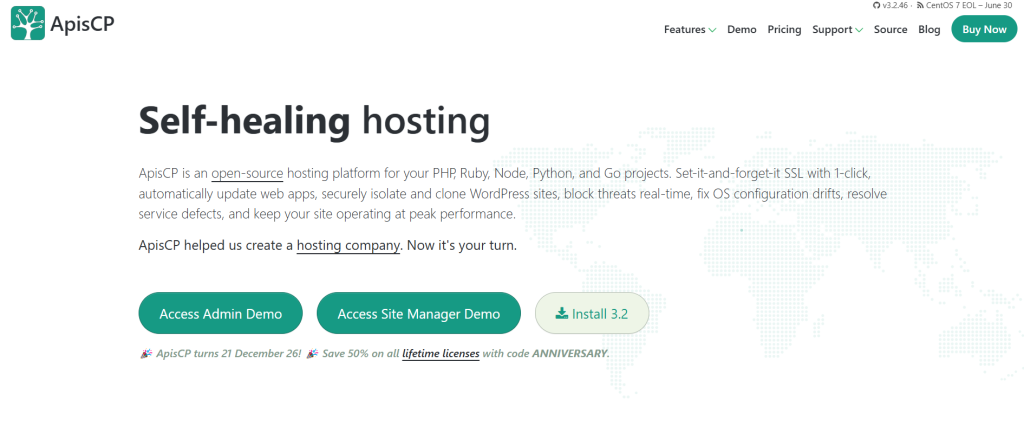
Pricing
SpinupWP is built specifically for WordPress, but RunCloud offers a more versatile solution. RunCloud optimizes WordPress deployments with caching and staging features and supports Laravel, custom PHP apps, and other technologies, making it a better all-rounder.
- Pro License: $20 per month per server. It hosts unlimited domains and accounts, includes panel updates, provides Bronze-level support (one free incident per year), and is transferable.
- Startup License: $50 per year per server. Allows up to 30 domains or accounts, with unlimited subdomains, users, and databases.
- Mini License: $30 per year per server. Supports up to 10 domains or accounts, with the same unlimited subdomains, users, and databases.
Froxlor is a lightweight, open-source (GPL) server management panel designed to simplify hosting platform administration. It focuses on providing a straightforward interface for managing domains, databases, email accounts, and server configurations without the heavy resource overhead associated with larger control panels like cPanel.
3. Moss
ServerPilot can be a suitable choice for basic PHP website hosting if you only manage a very small number of applications. However, if you want predictable costs, advanced features, and true scalability as your projects grow, RunCloud offers a stronger, more future-proof alternative.Definitely, whether you’re managing a few personal projects or hundreds of client sites across multiple servers, RunCloud’s platform is designed to grow with you. Features like team roles, unified monitoring, and multi-server management make scaling simple and secure.Both versions of Virtualmin aim to simplify the complexities of server administration. Users can handle essential tasks such as applying security updates, managing user accounts, deploying web applications, and configuring services like email and databases through a web-based control panel.Throughout this guide, we’ve explored a wide range of alternatives for server and website management. Each platform brings something valuable to the table, from open-source flexibility to WordPress-focused simplicity. But after comparing features, pricing structures, scalability, and real-world usability, one conclusion becomes clear:However, while ServerPilot covers the essentials, it comes with some noteworthy drawbacks. The pricing structure is unnecessarily complicated and can quickly become expensive for users managing multiple websites. ServerPilot charges separately for each connected server and each deployed application. This double-layer billing model means costs can escalate unpredictably as your infrastructure scales – something many users only realize once their projects are established.
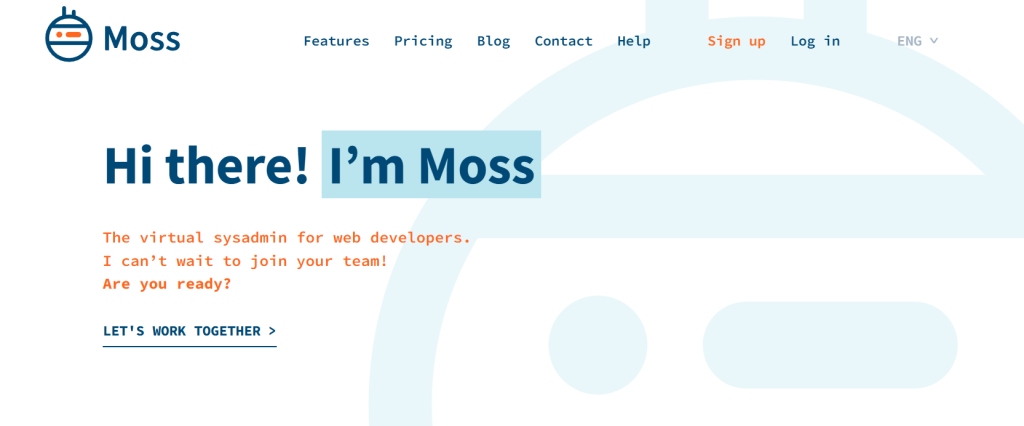
Pricing Plans
- Free: $0/month – Includes one integration and up to 25 Git deploys per month.
- Starter: $9/month – Two integrations, up to 50 Git deploys per month.
- Professional: $19/month – Three integrations, up to 150 deploys monthly.
- Unlimited: $49/month – No integration or deployment limits.
The SpinupWP platform automates many best practices for WordPress hosting right after site creation. This includes configuring Nginx with recommended caching rules (browser caching, full-page caching, and Redis object caching), obtaining and automatically renewing free Let’s Encrypt SSL certificates, setting up server-side cron jobs essential for WordPress scheduled tasks, and optimizing server configurations to maximize WordPress performance.
4. SpinupWP
RunCloud delivers the low-overhead, developer-centric experience that Froxlor users appreciate, but layers it with enterprise-level features, continuous updates, dedicated support, and the peace of mind that comes from using a platform purpose-built for critical production use.While Virtualmin provides a lot of flexibility, its interface and user experience are far less polished compared to modern alternatives. The learning curve can be steep, particularly for users who are unfamiliar with Linux server administration. Navigating configurations, troubleshooting, and setting up integrations often requires a level of technical proficiency that casual users or small teams may find challenging.While this hands-off approach may appeal to some, it also assumes that automation alone can handle all edge cases – a gamble that may not be ideal in production environments. For developers and teams who prefer visibility, control, and fast intervention when something breaks, a more transparent platform like RunCloud often feels more reassuring.Ajenti provides its web interface platform completely free of charge under the permissive MIT license. However, this open-source model also comes with trade-offs. Users should not expect consistent new feature rollouts or access to dedicated support channels. Development velocity can be sporadic, and maintaining Ajenti in production environments may require significant manual effort, particularly when dealing with updates, plugin maintenance, or troubleshooting unexpected issues.
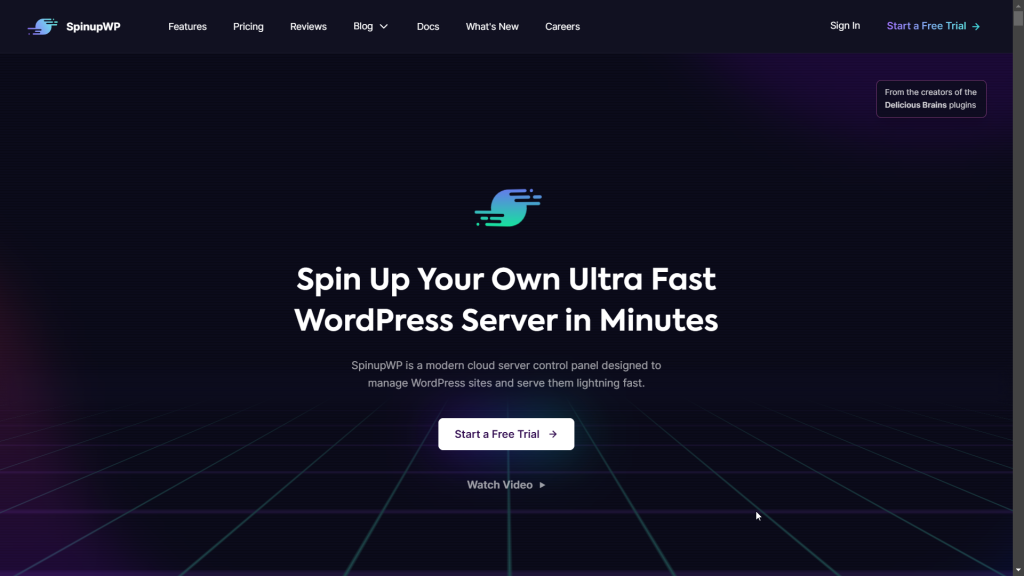
Pricing
- Essentials Plan: Starts at $12 per month for one server. Designed for a single user, it includes daily backups per site, standard email support, and unlimited staging sites.
- Advanced Plan: Starts at $19 per month for one server. This plan offers more flexible backup schedules (up to four daily, weekly, and monthly options), priority email support, multi-user access with permissions management, integrated site monitoring, and a “magic login” feature for WordPress sites.
Plesk comes with a range of built-in features for server management, including support for web hosting, email hosting, DNS management, and SSL installation. However, much of its functionality is modular, meaning that in order to unlock advanced features, you’ll need to install extensions from the extensive Plesk Extension Catalog.This guide will explore some of the best cPanel alternatives available in 2025. We will analyze their features, pricing, ease of use, and suitability for different use cases. Whether you’re a solo developer looking to reduce operational costs, a startup seeking more flexible management tools, or an enterprise requiring specialized functionality, this article will help you navigate the diverse landscape of server management platforms.SpinupWP is a strong choice if your hosting needs are purely WordPress-focused. It removes a lot of manual configuration work and makes it easy to deploy fast, well-optimized WordPress sites with best practices preconfigured out of the box.
5. ServerPilot
Virtualmin also provides solid backup capabilities, supporting cloud storage destinations including Amazon S3, Google Drive, and Dropbox. Migration tools allow users to transfer websites between servers, and detailed logging and monitoring are available for those who want to examine system metrics. It also includes one-click installers for popular applications like WordPress and phpMyAdmin, and even features a built-in terminal for command-line access via the browser.The platform has two distinct flavors: a community-supported open-source GPL version and a Pro version with additional features and commercial support. This flexibility allows users to choose based on their budget and level of technical expertise.However, its minimalistic approach comes with significant trade-offs. There’s no official support team to rely on, fewer built-in security hardening features, no integrated backup automation, and limited native tools for performance optimization. These gaps introduce unnecessary risks and maintenance burdens for businesses, agencies, or developers managing live client sites.However, it isn’t the only server management system out there.In addition, SpinupWP offers integrated backup functionality, allowing scheduled or on-demand backups to various cloud storage providers. Restoration is straightforward, ensuring that sites can be recovered quickly if something goes wrong.
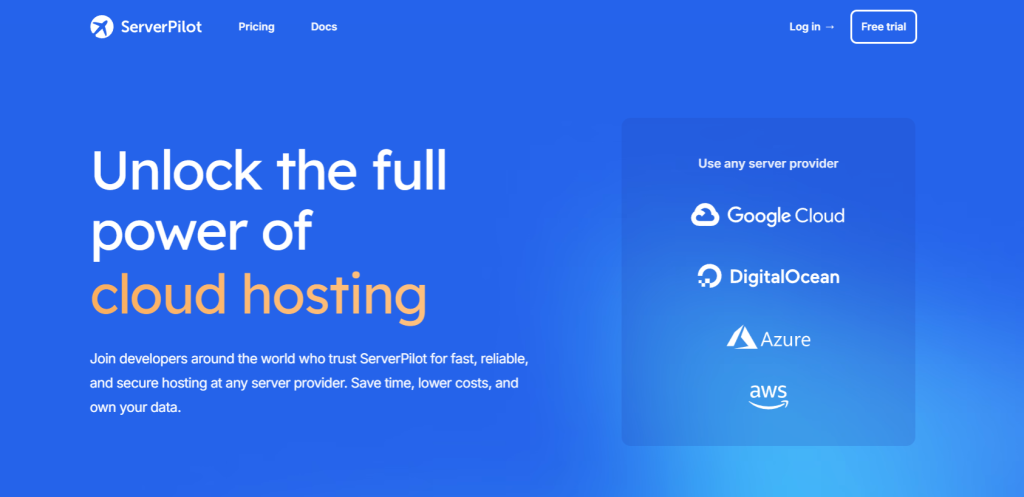
Pricing
- Economy Plan: Starting at $5 per server plus $0.50 per application monthly (billed hourly).
- Business Plan: Starting at $10 per server plus $1 per application monthly (adds log viewing, server resource metrics, and priority support).
- First Class Plan: Starting at $20 per server plus $2 per application monthly (adds detailed MySQL metrics and higher-priority support).
There are several open-source alternatives, including Virtualmin, Froxlor, and Ajenti. These options offer core server management features without licensing fees, but typically require more technical expertise. They often lack the polished interfaces, integrated security, and responsive support systems that platforms like RunCloud provide.
6. Virtualmin
However, the gaps quickly become apparent for businesses, agencies, or developers managing client projects. The lack of guaranteed updates, professional support, and limited scope of built-in features means Ajenti is often better suited for hobbyists or non-critical environments rather than production-grade hosting.Like any capable server management platform, Moss performs deployments with zero downtime. This ensures end users don’t experience service interruptions when your site is being updated – an important baseline feature that most tools in this category, including RunCloud, also provide as standard.cPanel has dominated the web hosting control panel market for over two decades and established itself as the industry standard for website and server management. Its user-friendly interface and comprehensive feature set have made it the go-to solution for hosting providers and server administrators worldwide.However, Plesk often feels bloated and slow for developers, agencies, and startups seeking a faster, more modern workflow. Dependency on individual extensions for essential functionality can lead to fragmented workflows, inconsistent update schedules, and occasional stability issues.
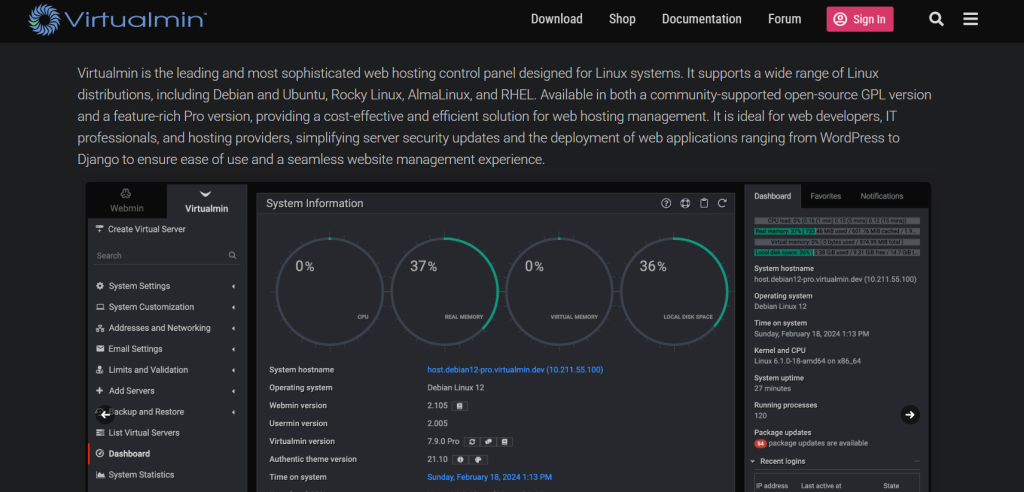
Pricing
- Virtualmin GPL: Free, open-source version with community support.
- Virtualmin Professional: $7.50 per month, allowing management of up to 10 domains, with enhanced features and commercial support.
📖 Recommended Read: Website Backups Without the HeadacheIn contrast, RunCloud offers a far more comprehensive platform with no hidden fees or layered per-app charges. You can connect unlimited applications to a single server at no additional cost. RunCloud’s built-in backup scheduling, full-stack flexibility (Nginx or Nginx+Apache), Git-based deployments, server monitoring, and advanced caching tools provide developers and agencies with everything they need, without nickel-and-diming along the way.There are a number of things that you need to consider before picking a server management solution.For users who prioritize flexibility, simplicity, and speed without sacrificing control, RunCloud delivers a far more developer-centric, efficient alternative, without the hidden operational overhead that comes with managing an ever-growing list of extensions.
7. Ajenti
Yes, absolutely. RunCloud supports PHP applications, Laravel projects, custom CMSs, static sites, and more. You’re not limited to WordPress – RunCloud adapts to a wide variety of tech stacks and project types, such as Nextcloud or GhostCMS.Moss is built with simplicity in mind, which also means it comes with some limitations. While the automation is convenient, the platform is opinionated about how things are set up and doesn’t offer much in terms of advanced customization or infrastructure insights. You won’t find native resource monitoring, detailed performance diagnostics, or multi-stack configuration options. And while it gets the job done for basic projects, teams managing high-performance sites or needing granular server control may outgrow Moss quickly.Plesk has long been a popular choice among shared hosting providers and businesses that need to manage multiple user accounts under a single server or cluster. It provides powerful administrative tools and a familiar environment for users coming from the traditional web hosting world.cPanel’s architecture is resource-heavy, with multiple background services consuming CPU and memory. Modern alternatives like RunCloud use lightweight, optimized stacks (Nginx, Redis caching, etc.) and minimal background processes, delivering faster and more responsive server performance.
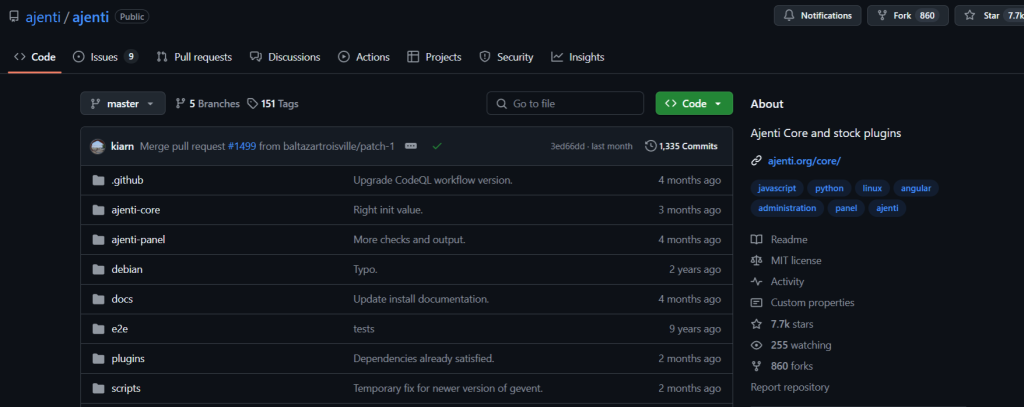
Pricing
- Ajenti: Free and open-source under the MIT License.
One of ServerPilot’s strengths is its straightforward access to server and application logs through the web interface. This eliminates the need for SSH access for basic diagnostic tasks, which is useful for developers or site owners who prefer working within a browser-based dashboard. ServerPilot also automates the deployment and renewal of free Let’s Encrypt SSL certificates and configures servers with modern security protocols like TLS 1.3 by default.For Linux veterans who enjoy granular configuration, Virtualmin remains a strong option. For teams who value time, scalability, and a better development experience, RunCloud is the more future-ready choice.The latest major release of Froxlor introduced meaningful improvements aimed at modernizing the platform. Notably, the user interface has been revamped to offer a fully responsive, mobile-friendly experience, with both light and dark modes and expanded customization options via Twig templates. These updates help make the panel more approachable and flexible for users who want to tailor the look and feel to their preferences.📖 Recommended Read: Website Backups
8. Froxlor
Ajenti appeals to a specific audience: developers and server administrators who want a simple, extensible, and self-managed control panel that they can customize freely. For personal projects, internal tools, or experimental servers, Ajenti offers a lightweight option without licensing costs.Yes, you can. Many developers now prefer modern cloud panels such as RunCloud, SpinupWP, or ServerPilot, or even manage servers manually via SSH. Tools like RunCloud offer better performance, lower resource usage, and more streamlined workflows compared to traditional control panels.No. RunCloud does not have any hidden “per-server” management charges beyond your subscription plan.
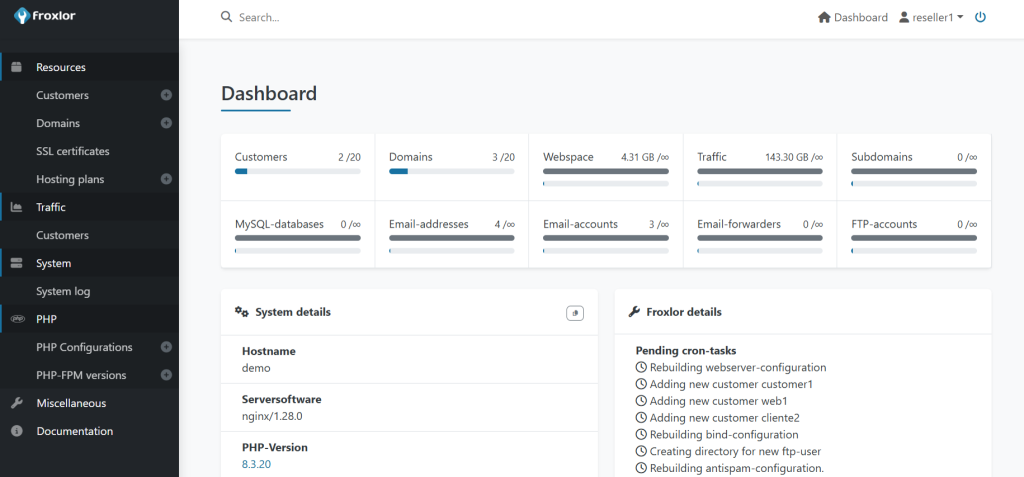
Pricing
- Froxlor: Free and open-source under the GPL license.
Unlike traditional control panels that feel outdated, fragmented, or restrictive, RunCloud is built for the realities of modern development. It offers full access to your servers without compromise, enabling you to manage, monitor, and scale projects with confidence. Whether you’re deploying WordPress sites, custom PHP applications, Laravel projects, or scaling agency workloads across multiple servers, RunCloud gives you the tools you need, with the efficiency and control you deserve.Plesk is a WebOps platform that manages user accounts, hosting resources, and service plans. Administrators can use it to create individual accounts, assign specific roles and permissions, and group users under subscriptions tied to pre-defined service plans that govern resource allocations such as disk space and bandwidth.Moss is well-suited for individual developers who want a fast way to get up and running with code deployments on an Ubuntu server. But for teams who need powerful tooling, automation, and server-level visibility built into the same platform, RunCloud offers a more complete long-term solution.RunCloud, on the other hand, is designed for developers first. It eliminates unnecessary bloat, offers seamless WordPress and PHP application management, enables Git-based deployments, and provides real-time performance monitoring – all within a lightweight, easy-to-navigate dashboard.Moss was developed to serve as a virtual assistant for your infrastructure, taking care of server setup and website deployments so you don’t have to. Once you connect a fresh Ubuntu server via SSH, Moss configures the necessary web and database environments automatically, making it especially attractive for smaller teams wanting a hands-off setup experience.
9. Plesk
RunCloud stands above the rest as the best all-around server management solution.Another limitation is that ServerPilot’s feature set is deliberately minimal. It does not include integrated backup management, native Git deployment, server-wide monitoring, or multi-stack options (e.g., Nginx configurations). These are critical tools for modern workflows that developers increasingly expect as standard.That said, the learning curve with ApisCP is noticeably steeper, and its ecosystem is more niche. While technically robust, its interface and workflow may be less intuitive for developers looking for immediate usability and broad community familiarity. Compared to more user-friendly platforms like RunCloud, ApisCP often appeals to power users who prefer manually tinkering and managing every layer of the server stack.
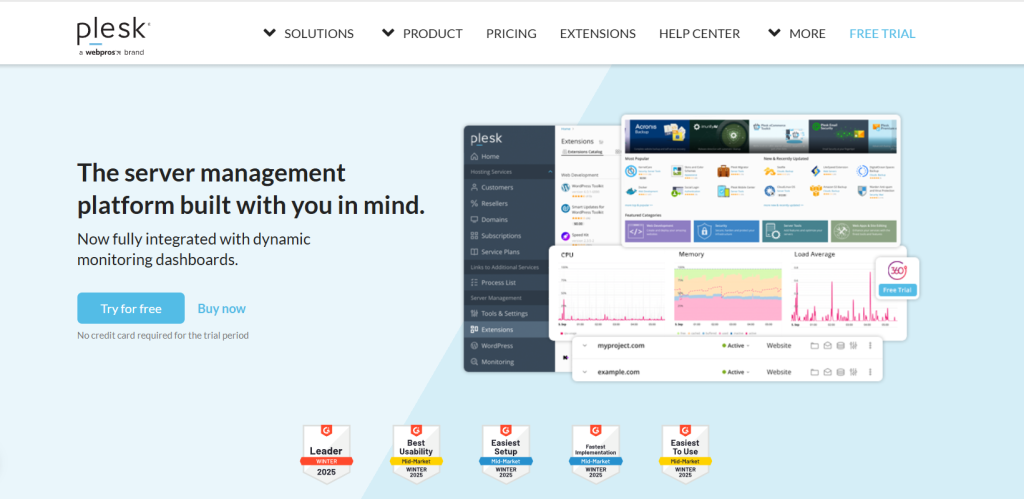
Pricing
- Web Admin Edition: $14.20/month – Supports up to 10 domains and includes WP Toolkit SE.
- Web Pro Edition: $24.74/month – Supports up to 30 domains and includes the full WP Toolkit.
- Web Host Edition: Approximately $61.41/month – Offers unlimited domain management and the full WP Toolkit.
For most developers and businesses, yes. RunCloud charges a flat monthly fee based on the server, not per domain or user account. Unlike cPanel’s layered pricing model, RunCloud lets you deploy unlimited applications on a single server without extra fees.Froxlor continues to maintain compatibility with major operating systems such as Debian 12 (Bookworm) and Ubuntu 24.04 (Noble). However, upgrading from older versions can present serious challenges. Unlike commercial solutions that offer migration assistance or automated upgrade paths, Froxlor relies heavily on community support and documentation. Managing upgrades manually can be risky and technically demanding, and in some cases, mistakes during an upgrade can result in significant downtime, potentially affecting all websites hosted on the server.Ajenti is a modular web interface platform built upon a Python library called Ajenti Core. This foundational component provides the essential infrastructure, including an event-loop-based HTTP server, a socket engine enabling features such as WebSockets (with XHR polling as a fallback), and a container system for managing plugins and modular functionality.Ajenti’s architecture is highly modular. Virtually any component can be replaced or extended via its Python API, offering flexibility for developers who want to customize routing, file handling, SSL implementation (including client certificate authentication), or server features through custom plugins. Dependency injection is used throughout the platform to manage services and plugins efficiently.
Final Thoughts: Why You Should Use RunCloud
Virtualmin is a comprehensive web hosting control panel engineered specifically for Linux systems. It is broadly compatible and supports major distributions like Debian, Ubuntu, and RHEL derivatives, including Rocky Linux and AlmaLinux. For developers and system administrators who prefer a Linux-first, command-line-centered environment, Virtualmin offers a robust foundation.But before we go ahead, there are a few things that you should consider before selecting a hosting solution.ApisCP offers value to those who want to customize their stack deeply and prefer an open-source foundation. However, for teams that prioritize ease of use, scalability, and out-of-the-box readiness, RunCloud offers a faster path to getting things done without sacrificing flexibility or control.Migrating from cPanel depends on the size and complexity of your setup, but RunCloud simplifies the process with tools like Git-based deployments, database importers, and one-click WordPress installations. With proper planning, many sites can be moved with minimal downtime.ApisCP is an open-source hosting control panel built with PHP, Ruby, Node.js, Python, and Go that is tailored to manage web applications. It’s engineered to provide a high degree of automation and includes built-in self-maintenance features. The goal is to offer server administrators and hosting providers a “set-it-and-forget-it” experience.Start your journey with RunCloud today and discover a more efficient way to manage, scale, and secure your servers.In fact, RunCloud is a far more compelling choice for developers, businesses, and agencies that want more control, better performance, and a modern workflow.ApisCP does include a strong range of automated features, such as one-click SSL certificate deployment and renewal via Let’s Encrypt, automatic updates for common web applications like WordPress, Joomla, and Drupal, and mechanisms for securely isolating individual websites. These are particularly useful for hosting providers managing many WordPress installs. There are also proactive security measures like real-time threat blocking and automated remediation of system misconfigurations.RunCloud delivers all of the core benefits of Virtualmin – Linux server compatibility, application management, backups, and monitoring – but wraps it in a clean, modern dashboard designed to streamline workflows rather than add friction. Developers get the full control they need without sacrificing usability, and teams can scale projects more easily thanks to RunCloud’s built-in automation, Git integrations, caching solutions, and multi-server management tools.
Frequently Asked Questions About cPanel Alternatives
What are the best free and open-source alternatives to cPanel?
Can I host a website without using cPanel?
What are the benefits of using RunCloud over traditional control panels?
Is RunCloud a good alternative to cPanel for beginners?
How easy is it to migrate from cPanel to an alternative like RunCloud?
Can I migrate my WordPress site from cPanel to RunCloud?
Does RunCloud support both Nginx and Apache server stacks?
Why is cPanel often slower compared to modern alternatives?
Can cPanel be hacked if not properly configured?
Does RunCloud include automated backup options?
Is RunCloud more affordable than cPanel?
Which is the best cPanel alternative for WordPress hosting?
Does RunCloud support hosting non-WordPress applications?
Does RunCloud offer customer support if I run into issues?
Can RunCloud scale with my business as I grow?
If you’re serious about server management, RunCloud isn’t just an alternative to cPanel. It’s a significant upgrade.






